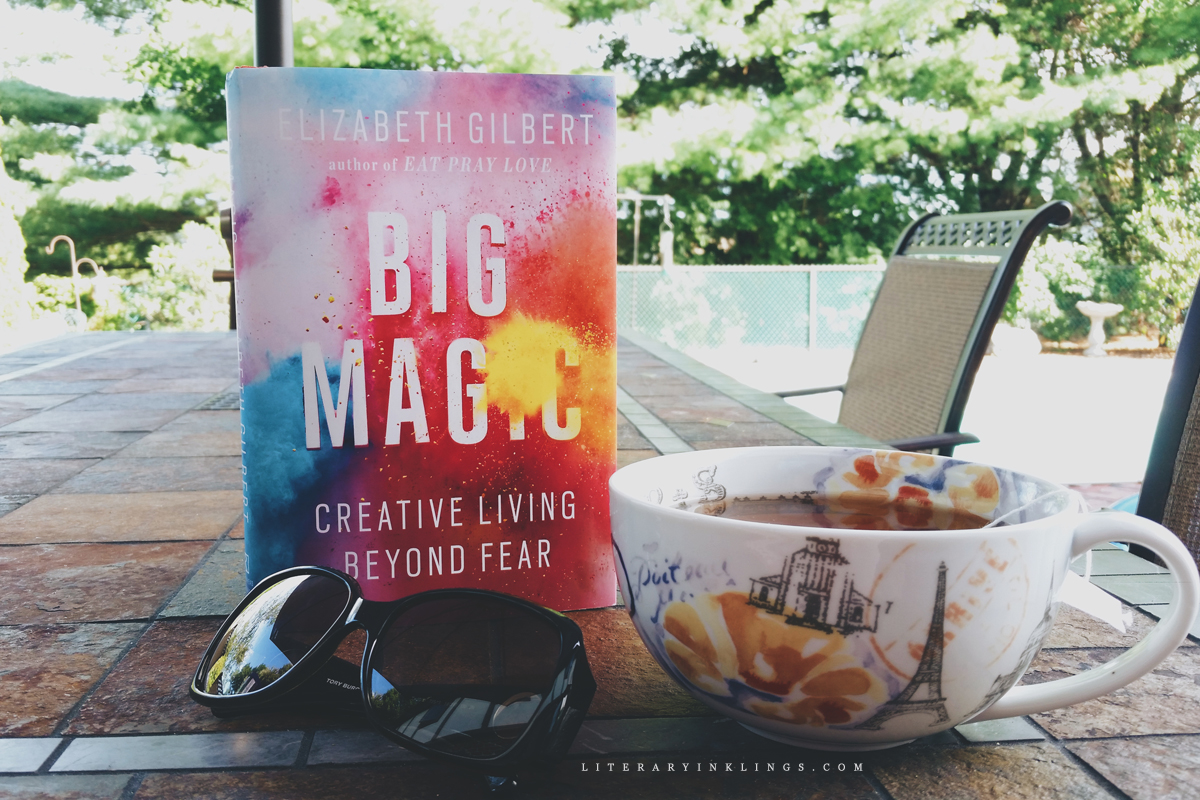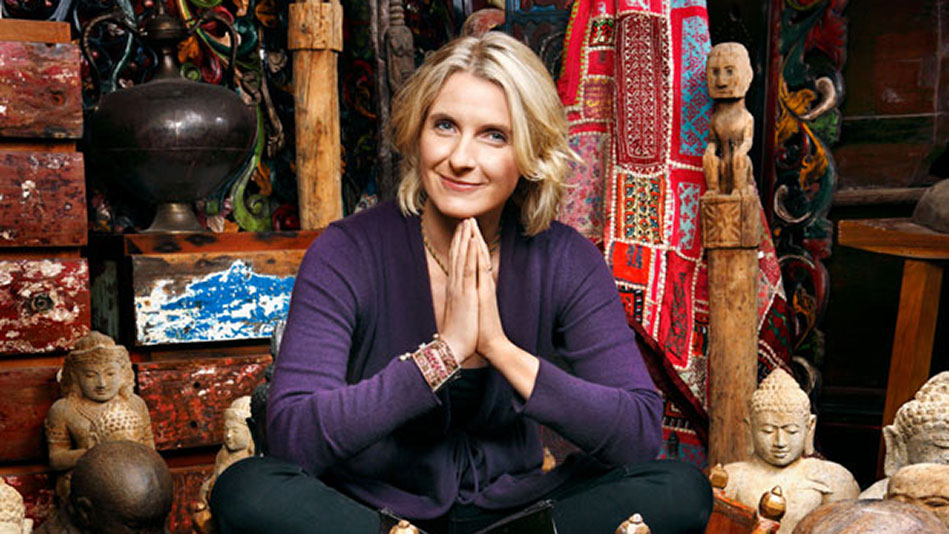No one is too busy to be creative?
Elizabeth Gilbert 's book Big Magic: Creative Living Beyond Fear has become a must-read reference for those who want to live creatively. Many readers said that thanks to practical advice in clarifying how the creative process took place, she helped to change the previous approach. The following article was recorded from the interview of Dana Rousmaniere ( Senior Assistant of Harvard Business Review ) with author Elizabeth Gilbert on the topic "creative thinking" that will help readers have the see more about her creative process as well as the perspective: creativity comes from within each of our people and everyone can become creative.

HBR: What is your advice to help people escape the creative path?
When a person feels stuck or empty, they often assume that they have lost their passion. Just like when their lives and minds should have become as good as a burning fire, instead, this fire is no different from the lump of coal that is about to die day after day, always like that. . The trick to re-igniting that fire is that everyone needs to focus on their curiosity instead of passion.
HBR: Why should focus on curiosity rather than passion?
We live in a culture that always chants " slogan , passion, passion" . but it's hard to find passion when you're tired or busy. Instead, ask yourself: "Is there anything that makes me even 1/8 of a percent curious about it?". This idea doesn't force you to shave your head, change their names or give up your current job, but it's like a hunt for birds eating rotten creatures, you need to look for the smallest, prey.
If you steadfastly do so, continuously for many days, even every day and hard to pursue wherever the curiosity leads, surely you will find the fire to "revive" or do burning creativity.

People often like to "escape" to start writing great books, making pottery or opening a bakery. Sometimes, we want to be like that: to live a free and meaningful life instead of going to work. However, throughout life, everyone must find a way to reconcile both. You have your own needs, your family has unique needs and bills need to be paid. Besides being concerned with these issues, you can still be creative. Set an alarm clock half an hour earlier each day and take time for your new business book or idea.
HBR: What do you think about the inevitable trade-offs?
A wise woman once asked me, "What are you willing to exchange for a life of desire?" I (Dana Rousmaniere) replied, "Wow, I guess I'll say no to things I don't want to do . " But, author Elizabeth said, "No, you'll have to say no to what you want to do - a party on Saturday night that you really want to go, a TV show you love . you will not do them anymore ".
People go to Facebook and tell me they don't have time to be creative. And I think: Please delete your Facebook account. If you have time to socialize to tell me how busy you are, you will have time to pursue your creative interests. That is the responsibility of each person. Once you know how to sacrifice what you want to do for something else, you will have time. An hour a day has been a huge amount of time. Imagine how good you would be to speak French if you spend an hour a day learning it. Small steps every day are so important.
HBR: Why did Einstein play the violin when he had difficulty solving a mathematical puzzle?
In Big Magic, she writes about a concept that Einstein calls "Combinatory Play" - an action that evokes an additional channel of intelligence when doing something else. That's why Einstein played the violin when he had difficulty solving a mathematical puzzle and she took part in a drawing class to improve writing skills. So what other practical things can people do to enhance their creative thoughts?

The best part of "Combinatory Play" is the word "play", which is what we stop doing when we are very young. If you want to think more creatively, ask yourself what you want to have fun with. In capitalist society, it is offensive, there is not much space to play while in fact, just having fun opens many other channels. I often play with exercises. If I walk for about an hour, I will come back with better ideas for my books. Do you realize that you have more ideas when driving or when you are taking a shower. It is because you are relaxed, relaxed and your mind is free to embrace new ideas. Playing baseball, baking, pottery or walking is also a form of "Combinatory Play" that you can choose from.
HBR: How did you balance the need between thinking and creative work alone with cooperation, brainstorming and learning from others?
It's like breathing in and breathing out - they're always together.
When I look for ideas, the best thing I can do is become busy as much as possible. When I was a journalist in the 90s, I had a friend who always joked that I had ideas that were due to frequent visits to the bar. I listened and learned a lot from the conversation in the bar. When I do the research, it is absolutely a matter of how they actually occur, or rather, I test my ideas in the real world. Right now in preparation for my upcoming novel about models in New York City in the 1940s, I am also conducting interviews about them.
There is a time you need to gather information and another time to ponder - when you say no to social gatherings, you don't go to the bar, you stop the interview and you start information processing. At this point, you close the door and turn off the electronic devices. Both of these times are indispensable - you just need time to process the data but cannot keep it behind the closed door. You must have time to interact with the outside world and time alone.

HBR: How is the role of others - mentors and partners - during her creative process?
I have never had a mentor but I have millions of teachers. I have worked with a lot of good editors, good writers and I have a list of my trusted friends while working and introducing my work to them. Everyone is looking for a "guru" (like a person with great influence in Hinduism) and this person is very important - I even went to India to find such a person so I know the feeling of wanting Have someone guide your life and work. But during my creative process, the greater benefit is not from a guru but from creating a small network of close and trusting people - who are in the same position as you.
We share each other's posts, care about each other, remind each other of deadlines and encourage each other to promote their work to people around the world. Those are the best editors I've ever known. Therefore, instead of looking for the most powerful mentor in the world, you should look for three or four suitable partners to create a support platform that you can rely on for the rest of your life.
HBR: How can you face criticism when making new ideas?
When you are doing something creative, you have to understand it will make you more vulnerable, because you are entering a new field without grasping the results. You will most likely fail and feel exposed. And do you know what to do when a person appears in your life and tells you: stop the idea, because she will be cruelly honest in her comment? Ignore her. Don't bring that adventurous idea of yours to a person who is always proud of their cruel honesty.
If someone tells me they are proud because they are cruelly honest, they are actually saying that they are cruel: " Give me the opportunity to hurt you. I like to hurt you. " These people do not deserve to see the most spread work you are doing. I only let people who really care about my interests and give a honest honest review of my work. Once your work has reached the world, you will receive enough cruelty from the outside. So you don't need to receive it before the book becomes widely available.

HBR: Is only the new job important?
In Big Magic, she turned the usual question "What would you do if you succeeded?" "What will you do if you even know you will fail?" As she said, when she was inspiring people, the word "failure" and "success" were completely opposite; So is the only new job important?
I work in publishing industry - an area with enough ups and downs. People in this world often say: "We're out of date. The publishing industry's heyday is over. Why are we still doing it?" But I work with Riverhead publisher and all the people I know here love their work. They are dynamic. They are creative. They are full of hope.
One day when I asked them why the working environment here is different from other companies, I get the answer because their boss always starts each meeting with the saying "If you fail to follow In increasingly interesting ways, you will never get into trouble in this company.You will only get in trouble if the form goes down . but if you try to experiment new and successful things, you will be promoted ". That message changed the whole culture at this publisher. That's why people always want to create the best ideas and want to work here. And that's why the authors, for example, I want to work with them.
The freedom to fail - as long as you fail in the most interesting ways - will create tremendous achievements.
You should read it
- ★ 7 simple ways to train creative thinking skills
- ★ 10 great ways to enhance your creative thinking skills at work
- ★ Brian Tracy: How to use creative thinking in solving problems as a genius?
- ★ 6 lessons from a full-fledged creative director
- ★ Eyes wide with the best way to solve the most haughty work in the world